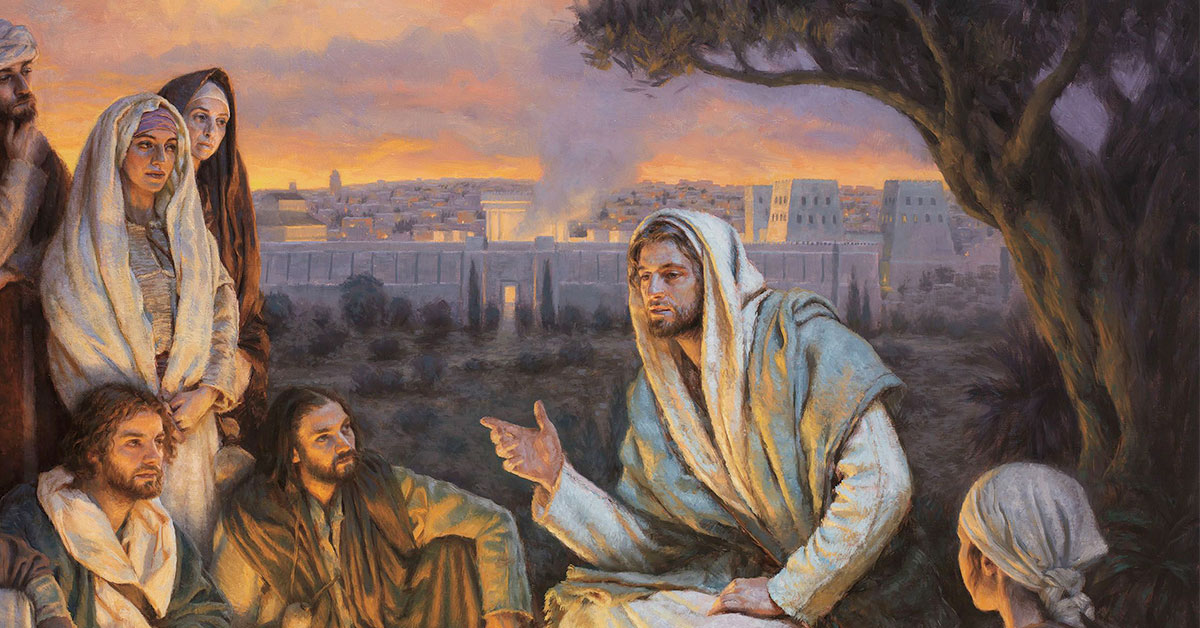You are here
Book of Mormon Central is in the process of migrating to our new Scripture Central website.
We ask for your patience during this transition. Over the coming weeks, all pages of bookofmormoncentral.org will be redirected to their corresponding page on scripturecentral.org, resulting in minimal disruption.
Come Follow Me 2020: 2 Nephi 31-33

Scripture Block
2 Nephi 31-33
March 2-8. “This Is the Way”
KnoWhys
Recommended Resources
Learn about the Book of Mormon with verse by verse commentaries from renowned Book of Mormon scholars like John W. Welch and Brant A. Gardner in the ScripturePlus app. Read this week's KnoWhy connected with the Come Follow Me curriculum, and watch a video elucidating an insight in this week's scripture reading.
Reading Plan
Structure your personal scripture study by following a multimedia, day by day plan. Each day's assignment includes the required scripture passages from the Come Follow Me curriculum, as well as suggestions for additional resources to bring context and understanding to your study. To dive deeper, skip down to Additional Resources for a selected bibliography on this week's chapters. If you are looking to dive deep into your study, skip down to "Additional Resources" for a selected bibliography of articles, books, and chapters on 2 Nephi 31–33.
Monday
- 2 Nephi 31:1–8
- Quote: “Plainness is best comprehended by the humble, the teachable, the intelligent, the wise, and the obedient. Often plain truths are perverted by the pretentious, the crude, the low, the critical, the contentious, the haughty, and the unrighteous. More so than in any other time in our history, there is an urgency in today’s society for men and women to step forward and teach the gospel of Jesus Christ in the power of plainness. God delights when His truths are taught clearly and understandably with no conspicuous ornamentation. Plainness in life, word, and conduct are eternal virtues. When the plainness of Christian teaching and living is lost, apostasy and suffering result. People walk in darkness when the light of plainness is taken from their lives.” Ashton, Marvin J. “The Power of Plainness.” General Conference April 1977.
- KnoWhy 258: Why Does the Lord Speak to Men “According to Their Language”?
- KnoWhy 59: What is the Purpose of Baptism in the Book of Mormon?
Tuesday
- 2 Nephi 31:9–16
- Quote: “2 Nephi 31 is a most distinctive scriptural text. In verse 11 Nephi records the words of the Father to him. In verse 12 the voice of the Son comes to him. The pattern repeats itself in reverse order in verses 14 and 15: in verse 14 we have a record of that spoken by the voice of the Son, verse 15 the voice of the Father. Apparently Nephi finds himself in conversation with both members of the Godhead. If such is the case, this is a singular occasion, inasmuch as revelation since the Fall has normally come by and through Jehovah, who is Jesus Christ.” McConkie, Joseph Fielding y Robert L. Millet. Doctrinal Commentary on the Book of Mormon. Vol. 1. Salt Lake City, UT: Deseret Book, 2007.
- Chart: The Gospel in the Book of Mormon
- Quote: "A 14-year-old boy recently said to me a little hesitantly, 'Brother Holland, I can’t say yet that I know the Church is true, but I believe it is.' I hugged that boy until his eyes bulged out. I told him with all the fervor of my soul that belief is a precious word, an even more precious act, and he need never apologize for 'only believing.' I told him that Christ Himself said, 'Be not afraid, only believe' . . . I told this boy that belief was always the first step toward conviction and that the definitive articles of our collective faith forcefully reiterate the phrase 'We believe.' And I told him how very proud I was of him for the honesty of his quest." Holland, Jeffrey R. “Lord, I Believe.” General Conference April 2013.
-
Quote: “Enduring to the end implies “patient continuance in well doing” striving to keep the commandments and doing the works of righteousness. It requires sacrifice and hard work. To endure to the end, we need to trust our Father in Heaven and make wise choices, including paying our tithes and offerings, honoring our temple covenants, and serving the Lord and one another willingly and faithfully in our Church callings and responsibilities. It means strength of character, selflessness, and humility; it means integrity and honesty to the Lord and our fellowmen. It means making our homes strong places of defense and a refuge against worldly evils; it means loving and honoring our spouses and children.
“By doing our best to endure to the end, a beautiful refinement will come into our lives. We will learn to “do good to them that hate [us], and pray for them which despitefully use [us]”. The blessings that come to us from enduring to the end in this life are real and very significant, and for the life to come they are beyond our comprehension.” Uchtdorf, Dieter F. “Have We Not Reason to Rejoice?” General Conference October 2007.
Wednesday
- 2 Nephi 31:17–21
- Quote: “Entering into the kingdom of God is so important that Jesus was baptized to show us ‘the straitness of the path, and the narrowness of the gate, by which [we] should enter’ (2 Ne. 31:9). ‘Notwithstanding he being holy, he showeth unto the children of men that, according to the flesh he humbleth himself before the Father, and witnesseth unto the Father that he would be obedient unto him in keeping his commandments’ (2 Ne. 31:7)” Hales, Robert D. “The Covenant of Baptism: To Be in the Kingdom and of the Kingdom.” General Conference October 2000.
- Quote: “Rely on Him. Rely on Him heavily. Rely on Him forever. And 'press forward with a steadfastness in Christ, having a perfect brightness of hope.' You are doing God’s work. You are doing it wonderfully well. He is blessing you and He will bless you, even—no, especially—when your days and your nights may be the most challenging. Like the woman who anonymously, meekly, perhaps even with hesitation and some embarrassment, fought her way through the crowd just to touch the hem of the Master’s garment, so Christ will say to the women who worry and wonder and sometimes weep over their responsibility as mothers, 'Daughter, be of good comfort; thy faith hath made thee whole.' And it will make your children whole as well.” Holland, Jeffrey R. “Because She is a Mother.” General Conference April 1997.
- Video: What is the Doctrine of Christ? (1:17)
Explore Further
- KnoWhy 58: What is the Doctrine of Christ?
- Quote: “Now, to anyone within the sound of my voice who has wondered regarding our Christianity, I bear this witness. I testify that Jesus Christ is the literal, living Son of our literal, living God. This Jesus is our Savior and Redeemer who, under the guidance of the Father, was the Creator of heaven and earth and all things that in them are. I bear witness that He was born of a virgin mother, that in His lifetime He performed mighty miracles observed by legions of His disciples and by His enemies as well. I testify that He had power over death because He was divine but that He willingly subjected Himself to death for our sake because for a period of time He was also mortal. I declare that in His willing submission to death He took upon Himself the sins of the world, paying an infinite price for every sorrow and sickness, every heartache and unhappiness from Adam to the end of the world. In doing so He conquered both the grave physically and hell spiritually and set the human family free. I bear witness that He was literally resurrected from the tomb and, after ascending to His Father to complete the process of that Resurrection, He appeared, repeatedly, to hundreds of disciples in the Old World and in the New. I know He is the Holy One of Israel, the Messiah who will one day come again in final glory, to reign on earth as Lord of lords and King of kings. I know that there is no other name given under heaven whereby a man can be saved and that only by relying wholly upon His merits, mercy, and everlasting grace can we gain eternal life.” Holland, Jeffrey R. “The Only True God and Jesus Christ Whom He Hath Sent.” General Conference October 2007.
- Quote: "No matter how long we have been off the path or how far away we have wandered, the moment we decide to change, God helps us return. From God’s perspective, through sincere repentance and pressing forward with a steadfastness in Christ, once back on the path, it will be as if we were never off. The Savior pays for our sins and frees us from the looming decrease in happiness and blessings. This is referred to in the scriptures as forgiveness. After baptism, all members slip off the path—some of us even dive off. Therefore, exercising faith in Jesus Christ, repenting, receiving help from Him, and being forgiven are not onetime events but lifelong processes, processes that are repetitive and iterative. This is how we 'endure to the end.'" Renlund, Dale G. “Choose You This Day.” General Conference October 2018.
Thursday
- 2 Nephi 32:1–6
- KnoWhy 60: What is it to Speak with the Tongue of Angels?
- Chart: How Can One “Feast upon the Words of Christ”?
- Quote: "First, feast upon the words of Christ. We must read the Book of Mormon in order to 'feast upon the words of Christ; for behold, the words of Christ will tell you all things what ye should do.' Feasting upon the words of Christ is a unique experience. When we read and look for principles and doctrines that will help us in our daily lives, we will have a renewed enthusiasm. For example, when the rising generation faces challenges in coping with peer pressure, we can read the book looking specifically for teachings that will help them with this kind of challenge. One of those teachings could be taken from Lemuel’s experience. Lemuel made some wrong choices because he yielded to Laman’s pressure. He did not do the right thing because he 'knew not the dealings of that God who had created them.' A principle that we can draw from this incident is that learning doctrine about how God deals with us will help us to cope with peer pressure. The Book of Mormon has more teachings and examples about this topic, and we are the generations who can benefit from the teachings of this book." Gonzalez, Walter F. “Becoming More Powerful Priesthood Holders.” General Conference October 2009.
Explore Further
- KnoWhy 306: How Can One “Feast upon the Words of Christ”?
Friday
- 2 Nephi 32:7–9
- Chart: Why Must One Pray Always to Endure to the End?
- Quote: “There is a risk that a person may not feel good enough to pray. This idea comes from that evil spirit who is the one who teaches us not to pray. It is as tragic to think we are too sinful to pray as it is for a very sick person to believe he is too sick to go to the doctor! We must not imagine that any kind of prayer, no matter how sincere, will be very effective if all we do is to say the prayer. We must not only say our prayers; we must also live them. The Lord is much more pleased with the person who prays and then goes to work than with the person who only prays. Much like medicine, prayer works only when we use it as directed.” Cornish, J. Devn. “The Privilege of Prayer.” General Conference October 2011.
- Quote: “[The gift of the Holy Spirit] quickens all the intellectual faculties, increases, enlarges, expands and purifies all the natural passions and affections; and adapts them, by the gift of wisdom, to their lawful use. It inspires, develops, cultivates and matures all the fine-toned sympathies, joys, tastes, kindred feelings and affections of our nature. It inspires virtue, kindness, goodness, tenderness, gentleness and charity. It develops beauty of person, form and features. It tends to health, vigor, animation and social feeling. It develops and invigorates all the faculties of the physical and intellectual man. It strengthens, invigorates, and gives tone to the nerves. In short, it is, as it were, marrow to the bone, joy to the heart, light to the eyes, music to the ears, and life to the whole being.” Pratt, Parley P. Key to the Science of Theology. Liverpool: L.D. Saints Book Dept, 1855.
Explore Further
- KnoWhy 298: Why Must One Pray Always to Endure to the End?
Saturday
- 2 Nephi 33:1–9
- KnoWhy 61: Why Did Nephi End His Sacred Record with His Testimony of the Redeemer?
- Quote: “The power of the Spirit carries the message unto but not necessarily into the heart. A teacher can explain, demonstrate, persuade, and testify, and do so with great spiritual power and effectiveness. Ultimately, however, the content of a message and the witness of the Holy Ghost penetrate into the heart only if a receiver allows them to enter. Learning by faith opens the pathway into the heart.” Bednar, David A. “Seek Learning by Faith.” Ensign (September 2007): 61-68.
Sunday
- 2 Nephi 33:10–15
- Quote: "No wonder the Book of Mormon proclaims with boldness, 'And if ye shall believe in Christ ye will believe in these words, for they are the words of Christ.' Together with the Bible, the Book of Mormon is an indispensable witness of the doctrines of Christ and His divinity. Together with the Bible, it 'teach[es] all men that they should do good.' And together with the Bible, it brings us to 'one Lord, one faith, one baptism.' That is why the Book of Mormon is so crucial in our lives.” Callister, Tad R. "The Book of Mormon—A Book from God." General Conference October 2011.
- KnoWhy 2: An Apostle's Witness
- Quote: “Do eternal consequences rest upon our response to this book? Yes, either to our blessing or our condemnation. Every Latter-day Saint should make the study of this book a lifetime pursuit. Otherwise he is placing his soul in jeopardy and neglecting that which could give spiritual and intellectual unity to his whole life. There is a difference between a convert who is built on the rock of Christ through the Book of Mormon and stays hold of that iron rod, and one who is not.” Benson, Ezra Taft. A Witness and a Warning: a Modern-Day Prophet Testifies of the Book of Mormon. Salt Lake City, UT: Deseret Book Co., 1999.
Additional Resources (Bibliography)
Poetry Selections
Anderson, Sharon. "Israel Remembers (2 Nephi 31:5)." The Glory of the Son—Poetic Insights: Jesus Christ and God’s Great Plan of Happiness.
2 Nephi 31
Dahl, Larry E.. "The Doctrine of Christ: 2 Nephi 31-32." In The Book of Mormon: Second Nephi, The Doctrinal Structure, edited by Monte S. Nyman and Charles D. Tate, Jr., 355-375. Provo, UT: Religious Studies Center, Brigham Young University, 1989.
Parker, Jared T. “The Doctrine of Christ in 2 Nephi 31–32 as an Approach to the Vision of the Tree of Lifev.” In The Things Which My Father Saw: Approaches to Lehi’s Dream and Nephi’s Vision (2011 Sperry Symposium), ed. Daniel L. Belnap, Gaye Strathearn, and Stanley A. Johnson. Provo, UT: Religious Studies Center, Brigham Young University; Salt Lake City: Deseret Book, 2011, 161–78.
Reynolds, Noel B.. "The Gospel According to Nephi: An Essay on 2 Nephi 31." Religious Educator: Perspectives on the Restored Gospel 16, no. 2 (2015): 51-75.
2 Nephi 31:2
Parker, Michael B. “Nephi’s Later Reflections on the Tree of Life Vision.” Insights: A Window on the Ancient World 22, no. 5 (2002): 2–3.
2 Nephi 31:3
Book of Mormon Central. “Why Does the Lord Speak to Men “According to Their Language”? (2 Nephi 31:3).” KnoWhy (January 6, 2017).
Sorenson, John L., Angela M. Crowell, and Allen J. Christenson. "Parallelism, Merismus, and Difrasismo." In Reexploring the Book of Mormon, edited by John W. Welch, 80-82. Provo, UT/Salt Lake City: FARMS/Deseret Book, 1992.
2 Nephi 31:6–7
Book of Mormon Central. “What is the Purpose of Baptism in the Book of Mormon? (2 Nephi 31:6–7).” KnoWhy 59 (March 22, 2016).
2 Nephi 31:12
Rasband, Ester. "The Third Commandment." Ensign 29, no. 4 (1999).
2 Nephi 31:15
Maxwell, Neal A.. "“Endure It Well”." Ensign 20, no. 5 (1990): 42-46.
2 Nephi 31:21
Book of Mormon Central. “What is the Doctrine of Christ? (2 Nephi 31:21).” KnoWhy 58 (March 21, 2016).
Jack, Elaine L.. “Walk with Me” In The 164th Annual General Conference of the Church of Jesus Christ of Latter-day Saints. Salt Lake City: The Church of Jesus Christ of Latter-day Saints, 1994.
Reynolds, Noel B.. ""This Is the Way"." Religious Educator: Perspectives on the Restored Gospel 14, no. 3 (2013): 79-91.
Reynolds, Noel B.. "The Fifth Principle of the Gospel." Religious Educator: Perspectives on the Restored Gospel 15, no. 3 (2014): 116-127.
Welch, John W., and Greg Welch. The Gospel in the Book of Mormon. Provo, UT: Foundation for Ancient Research and Mormon Studies, 1999.
2 Nephi 32
Dahl, Larry E.. "The Doctrine of Christ: 2 Nephi 31-32." In The Book of Mormon: Second Nephi, The Doctrinal Structure, edited by Monte S. Nyman and Charles D. Tate, Jr., 355-375. Provo, UT: Religious Studies Center, Brigham Young University, 1989.
Parker, Jared T. “The Doctrine of Christ in 2 Nephi 31–32 as an Approach to the Vision of the Tree of Lifev.” In The Things Which My Father Saw: Approaches to Lehi’s Dream and Nephi’s Vision (2011 Sperry Symposium), ed. Daniel L. Belnap, Gaye Strathearn, and Stanley A. Johnson. Provo, UT: Religious Studies Center, Brigham Young University; Salt Lake City: Deseret Book, 2011, 161–78.
2 Nephi 32:3
Book of Mormon Central. “How Can One “Feast upon the Words of Christ”? (2 Nephi 32:4).” KnoWhy 306 (April 28, 2017).
2 Nephi 32:8–9
Book of Mormon Central. “Why Must One Pray Always to Endure to the End? (2 Nephi 32:8–9).” KnoWhy 298 (April 10, 2017).
2 Nephi 32:13
Book of Mormon Central. “What is it to Speak with the Tongue of Angels? (2 Nephi 32:2).” KnoWhy 60 (March 23, 2016).
Rappleye, Neal. “'With the Tongue of Angels': Angelic Speech as a Form of Deification.” Interpreter: A Journal of Mormon Scripture 21 (2016): 303–323.
2 Nephi 33
Garrett, H. Dean. "Nephi's Farewell." In The Book of Mormon: Second Nephi, The Doctrinal Structure, edited by Monte S. Nyman and Charles D. Tate, Jr., 377-390. Provo, UT: Religious Studies Center, Brigham Young University, 1989.
2 Nephi 33:2
Welch, John W.. "No, Sir, That's Not History!" In Reexploring the Book of Mormon, edited by John W. Welch, 88-92. Provo, UT/Salt Lake City: FARMS/Deseret Book, 1992.
2 Nephi 33:6–10
Book of Mormon Central. “Why Did Nephi End His Sacred Record with His Testimony of the Redeemer? (2 Nephi 33:6).” KnoWhy 61 (March 24, 2016).
Rust, Richard Dilworth. "The Book of Mormon, Designed for Our Day: Annual FARMS Lecture." Review of Books on the Book of Mormon 2, no. 1 (1990): 1-23.
2 Nephi 33:10
Welch, John W., and Greg Welch. Nephi's Testimony. Provo, UT: Foundation for Ancient Research and Mormon Studies, 1999.
2 Nephi 33:11
Book of Mormon Central. “An Apostle's Witness (2 Nephi 33:6).” KnoWhy 2 (January 2, 2016).




